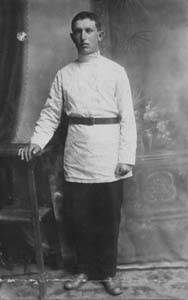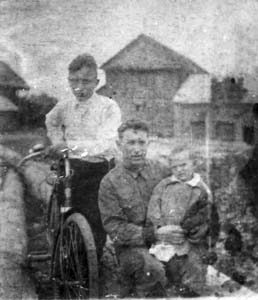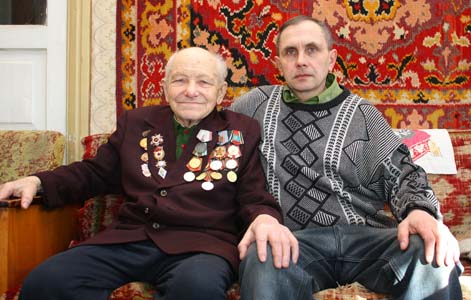

Проект «Голоса еврейских местечек. Могилевская область».פיתוח קשרי התרבות בין העמים של ישראל ובלרוס
|
|---|
Поиск по сайту |
|
MainNew publicationsContactsSite mapVitebsk regionMogilev regionMinsk regionArkady Shulman
|
Arkady ShulmanLEV MANEVICH'S DESTINYHe lives in a small wooden house in Peskovatiki. Many years ago this part of Vitebsk was mainly Jewish. He lives here with his son. His daughter and her family are in Israel. His wife passed away. Here is the story that I've heard from Lev Manevich. - I was born on March 2, 1923 near the village of Mozhevoye, in Kostukovichi region and later the family moved to Mstislavl. My parents were peasants. When the war started I was in a college in Minsk, studying history. On June 22 I found out about the war. I was immediately mobilized. The day before the mobilization I visited all of my relatives and said goodbye to them.  Lev's father,
Lev's father,Genukh Girshevich Manevich. - What happened to your relatives that were living in Mstislavl? - The same as what happened to the rest of the Jews. When I came back from the war I found out that my father and my whole family were shot by German occupants in 1941 in Mstislavl. At the first possibility I went to Mstislavl with my son. One of the local women told me what had happened… - My parents had decided to stay on the occupied territory. They left Mstislavl and settled down with some people. Then a Nazi policeman arrived and ordered them to get into a horse carriage. My younger brother Israel tried to escape. I had also another brother, the youngest in the family and a sister. The policeman intended to shoot but my mom began shouting and crying and Israel stopped. He was caught and made to get into the carriage. Then they were shot in Mstislavl.  Lev Manevich, his younger brother
Lev Manevich, his younger brotherand father. I was at the battlefront from December 1941 to July 1942. In summer we were retreating towards Stalingrad. Somewhere near Donets we were surrounded. Then we were captured by Romanians – it was July 12, 1942. They did not realize I was Jewish. There was another Jewish soldier among us – he was immediately shot. My friends told me to change my name to Petr Vasilievich Shvedov, which helped me to survive. I was held in captivity for three years. I did not look Jewish and no one from my regiment gave me away, even they knew who I was. Then, just like all the prisoners, I was given a metal tab with a number. I will never forget it - 84481… Later I was sent to two more camps – in Lisichansk and Proskurov. Germans in the camp were looking for Jews. Twenty or thirty Jews were given away in the second camp. The people who had given them away were rewarded with a pot of porridge and an old overcoat. Jews were not immediately shot – first they were tortured. When I was sent to the third camp, there were no more Jews left with us. Most probably, all of them had been killed. I was the only one to survive. At the end of 1942 I was sent to the town of Hagen in Western Germany. We were sent to a hug concentration camp. Here lived Russians, Belarusians, Ukrainians, the French and the British. The French and the British lived there as if it were a resort – they were wearing shorts, played volleyball and football. The Red Cross and their relatives sent them packages. The Soviet prisoners, on the other hand, were kept in the camp as animals, in a separate sector.  Lev Manevich with his son.
Lev Manevich with his son.
I did not stay long in Hagen. However, one time there I was on the verge of death. Upon arrival in Hagen we were all undressed and sent to a bathhouse. For me, a Jewish man, this could end badly… My parents were not religious but they did adhere to Jewish traditions… There were about 70-80 people in the bathhouse. At the exit there was a young man who carefully checked everyone. Going towards the door would definitely mean death. I had to think of something. When there were a few people left I joined the line. When I approached the inspector, I told him I was from Minsk and immediately dashed to the crowd of the people who had gone through the inspection. No one gave me away. I was glad that the inspector did not have the time to look for me. Later Germans came to our camp to select people for work. I was thus sent to another work camp, where I spent almost two years. Lev Manevich went through five fascist camps and he was lucky to survive all of them… When we were liberated and sent back home, we were sent to another camp, a Soviet one. We spent two months there, and it was not better than any German camp. From the camp I was sent to work in the mines, which was terrible. I ran away from the camp and went to Minsk, where I found some of my documents. Later I managed to finish my studies and worked in an orphanage and at school. Lev Manevich's video interview |
|||
|
|
Jewish settlements in Mogilev regionMogilev• Antonovka• Batsevichi• Belynichi• Belynkovichi• Bobruisk• Byhov• Chausy• Cherikov• Dashkovka• Dribin• Esmony• Glusk• Golovchin• Gorki• Gory• Grozdianka• Hotimsk• Kirovsk• Klichev• Konohovka• Kostukovichi• Krichev• Krucha• Krugloye• Lenino• Lubonichi• Martinovka• Moliatichi• Mstislavl• Naprasnovka• Osipovichi• Rodnia• Rudkovschina• Samotevichi• Sapezhinka• Selets• Shamovo• Shepelevichi• Shklov• Slavgorod• Staroselie• Sukhari• Svisloch• Vereschaki• Zaverezhie• Zhilichi• |
Main |
New publications |
Contacts |
Site map |
Vitebsk region |
Mogilev region |
Minsk region |